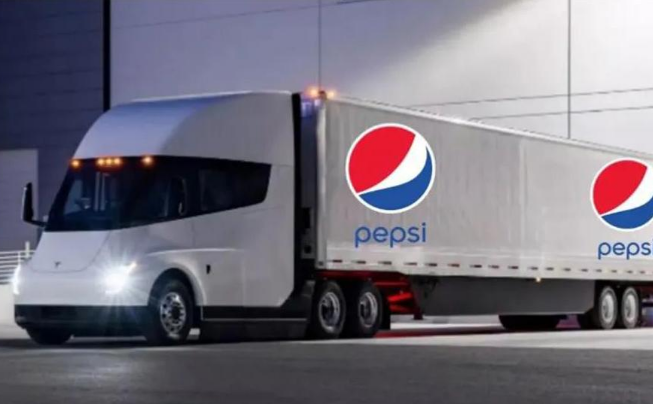On October 6, Musk tweeted that Tesla's five-year-old semi truck would soon be delivered to PepsiCo on December 1, adding that the vehicles would have a range of 500 miles (805 km).
Pepsi also confirmed in a statement on Oct. 7 that it would receive the trucks on Dec. 1 at two plants in California. That date is three years later than Tesla originally promised.
"We can confirm that PepsiCo will receive the first shipment of electric Tesla semi trucks supporting our snack plant in Modesto, California and beverage plant in Sacramento on December 1, 2022." "We will provide additional details as we receive the vehicle," Pepsi indicated in an email.
PepsiCo aims to achieve net zero emissions in its supply chain by 2040.
Tesla announced the semi back in 2017. "Order now, pick up the car in two years." Musk claimed at the event that he quickly received pre-orders from a number of large names, including Walmart, DHL, Anheuser Busch and PepsiCo, with deposits ranging from $5,000 to $20,000 per car.
Tesla claimed a base model with a range of 300 miles (483 kilometers) would cost around $150,000, and a model with a range of 500 miles (805 kilometers) would cost about $180,000.
To reduce fuel costs while lowering emissions, PepsiCo Semi Trailer Manufacturers ordered 100 Tesla all-electric semi trucks in 2017 and expects to deploy the first 15 by the end of this year, Reuters reported.
According to Musk's tweet, Tesla began production of a 500-mile model this year. It is unclear when deliveries of the 300-mile models will begin.
Why are trucks that were supposed to arrive in 2019 three years late? During that time, Tesla focused on producing the Model 3 and Model Y, while it also faced supply problems with cells and semiconductors.
 Foreign media joked that Pepsi must now be counting the days, hoping the delivery date is real. Given Musk's history of procrastination, and the volatility with which he acquired Twitter, the semitrailer's delay is not surprising.
Foreign media joked that Pepsi must now be counting the days, hoping the delivery date is real. Given Musk's history of procrastination, and the volatility with which he acquired Twitter, the semitrailer's delay is not surprising.
According to foreign media, one of Musk's best practices is to deflect public attention with a fresh announcement. One possibility is that he wants to deflect attention from the Twitter deal, or even to prove to Tesla shareholders that everything is working correctly, since Tesla's stock is falling in value, which is the same amount of money he intended to use to buy Twitter.
On October 6, Musk tweeted: "Plot twist" in response to Twitter's rejection of his renewed $44 billion takeover offer.
Initially, Musk forced a takeover, and Twitter's board refused to sell. By the time Twitter's board approved the sale, Musk changed his mind and unilaterally called off the deal. By the time Twitter announced it was suing Musk, and now the two sides are going to court, Musk is going to pay the full price.
In recent months, Tesla shareholders have nearly had plenty of the CEO's Twitter drama, fearing that buying Twitter would distract him from Tesla at an critical time.
In January, Mr Musk told analysts that Tesla would not introduce any current models this year because of parts supply constraints. He changed his tune three days after the U.S. Senate passed the Inflation Reduction Act, which makes heavy-duty electric trucks eligible for federal tax breaks of up to $40,000. The CEO tweeted on August 10 that the company will start delivering 500-mile semi trucks this year.
Tesla will be competing with additional all-electric large truck makers, including start-up Nikola and more established players like Volvo. Volvo announced in October that it would deliver 20 all-electric trucks to Amazon by the end of the year.